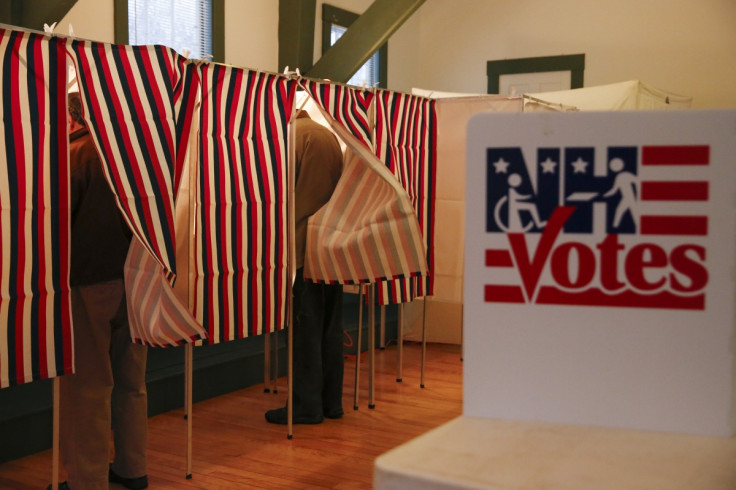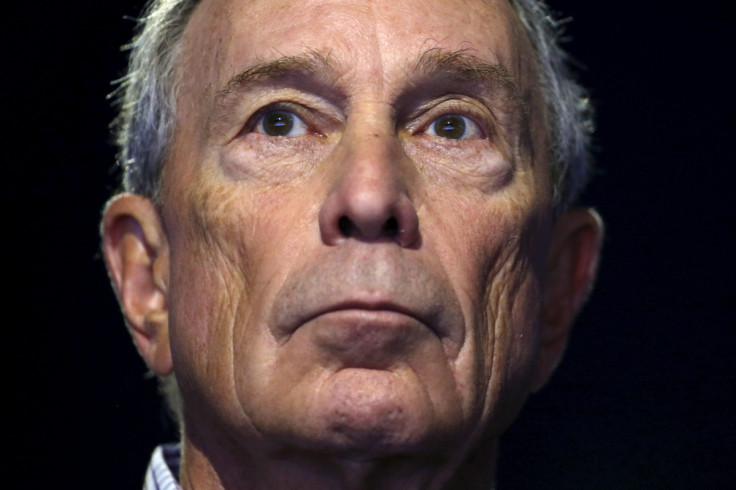New Hampshire primary as it happened: Bernie Sanders and Donald Trump win by a landslide

- Democrat Bernie Sanders and Republican Donald Trump won New Hampshire by double digits. Democrats head to Nevada for caucus on 20 February, while Republicans head to South Carolina for the primary.
- The first-in-the-nation primary in New Hampshire began at midnight (9 February) in several locations and ended at 7pm EST (12am GMT).
- Unlike in the Iowa caucus, undecided voters comprise of nearly 40% of the voters in the Granite State. Those votes were crucial in deciding who takes the state in each party.
- For a complete breakdown of how the primaries work, check out our complete guide to the New Hampshire primary.
Final Results
Democrats 100% reporting
Bernie Sanders: 60% ★
Hillary Clinton: 38%
Republicans 100% reporting
Donald Trump: 35% ★
John Kasich: 16%
Ted Cruz: 12%
Jeb Bush: 11%
Marco Rubio: 11%
Chris Christie: 7%
Carly Fiorina: 4%
Ben Carson: 2%
★ New Hampshire primary winner
Former Hewlett-Packard CEO, and the only woman running for the Republican nomination, Carly Fiorina has vowed to remain in the race despite only winning a little over 4% of the votes in New Hampshire. "We have a long way to go in terms of knowing how things are going to exactly settle out, but we feel very encouraged," she said at a rally. "We are going to keep going."
Fiorina added, "I'm convinced this is my highest calling as a leader, and you have given me the energy and the determination and wind at our backs to continue this great fight."
h/t The Hill
Looking ahead to the South Carolina primary, the Real Clear Politics averages have Donald Trump once again leading with double digits. A NBC News/WSJ/Marist poll in January found Trump ahead of Cruz by 16 points, 36% to 20%. They were followed by Rubio (14%) and Bush (9%). Of course, a lot has happened since the poll's release. Two of the candidates featured in the poll have dropped out, with three other candidates (Christie, Fiorina and Carson) potentially suspending their campaigns before South Carolina.
Note: The New Hampshire Republican primary requires candidates to earn 10% of the vote to take home any delegates. Candidates below 10%—in this case Chris Christie, Carly Fiorina and Ben Carson—forfeit their percentages to the primary's winner: Donald Trump. Marco Rubio, currently sitting in fifth place with 80.33% reporting, barely passes the 10% mark with 10.5%.
h/t The Guardian
Fun fact: Bernie Sanders makes history as the first Jewish candidate to win a state primary.
h/t The Hill
Instead of heading to Nevada ahead of the 20 February caucus, NH primary winner Bernie Sanders is traveling to New York City. His visit isn't for a fundraiser, but rather a breakfast with Rev Al Sharpton. Two people briefed with the meeting said the get together is set to take place at Sylvia's Restaurant in Harlem.
Rubio acknowledges poor performance during Saturday's debate and promises "it will never happen again".
.@marcorubio: "I did not do well on Saturday night... that will never happen again" https://t.co/kSdvNIZfxv https://t.co/tgKVjMdEmd
— CNN Politics (@CNNPolitics) February 10, 2016
Republicans are clearly already gearing up for a big fight in South Carolina. Bush spokesman Tim Miller spoke out against 2nd place winner John Kasich: "He doesn't have a constituency past New Hampshire. He does not have a viable path to the nomination, and he certainly does not have a viable path in South Carolina."
South Carolina Senator Lindsey Graham—who also ran as a Republican hopeful—is also stumping for Bush. "The best is yet to come, folks," he told reporters, adding that the "Bush family name is golden in my state."
h/t BuzzFeed News
South Carolina is next for Republicans. Real Clear Politics reports Donald Trump leading there too:
Trump led entire way in NH, & won decisively.
— Taniel (@Taniel) February 10, 2016
He's been as dominant in SC polls for now. RCP chart since Labor Day: pic.twitter.com/AU3uK2TYTI
I am going to be the greatest jobs as president that God ever created.
- Donald Trump
"Thank you, NH. now it on to Nevada, South Carolina and beyond." @berniesanders #wbzNHprimary pic.twitter.com/CoE6s63X52
— AndreaWBZ (@AndreaWBZ) February 10, 2016
Taking a page out of the Huffington Post's handbook, the New York Daily News released a preview of its front page tomorrow.
Tomorrow's front page:
— New York Daily News (@NYDailyNews) February 10, 2016
DAWN OF THE BRAIN DEAD - Trump comes back to life with N.H. win: https://t.co/rkj242rGEf pic.twitter.com/LRWPDIJJfL
Trump and Sanders aren't the only ones celebrating tonight. ABC News has projected Kasich will take second place among Republicans, leading to his own celebrations.
Can't beat the energy at this election night party! https://t.co/dA1l07WghF
— John Kasich (@JohnKasich) February 10, 2016
To @BernieSanders, congratulations. To New Hampshire, thank you. And to our volunteers: I’m so grateful for what you built. Now, onward. -H
— Hillary Clinton (@HillaryClinton) February 10, 2016
Hillary lost nearly every demographic group except two: voters over 65 years old and w/family incomes of $200,000+. pic.twitter.com/jEYNPhKda8
— Don Van Natta Jr. (@DVNJr) February 10, 2016
The Clinton campaign has officially sent out a memo regarding her loss in New Hampshire and says she is looking ahead to March.
The full memo:
TO: Interested Parties
FROM: Robby Mook, Campaign Manager, Hillary for America
RE: March Matters
Story Continued Below
After splitting the first two contests, an outcome we've long anticipated, attention will inevitably focus on the next two of the "early four" states: Nevada and South Carolina. We've built first-rate organizations in each state and we feel very good about our prospects for success.
But at the same time as we are competing aggressively in Nevada and South Carolina, it's important to understand why the campaign is investing so much time, energy and resources in states with primaries and caucuses in March. The reason is simple: while important, the first four states represent just 4% of the delegates needed to secure the nomination; the 28 states that vote (or caucus) in March will award 56% of the delegates needed to win. And whereas the electorates in Iowa and New Hampshire are largely rural/suburban and predominantly white, the March states better reflect the true diversity of the Democratic Party and the nation – including large populations of voters who live in big cities and small towns, and voters with a much broader range of races and religions. The nomination will very likely be won in March, not February, and we believe that Hillary Clinton is well positioned to build a strong – potentially insurmountable – delegate lead next month.
Why March Matters So Much
For Hillary Clinton and her campaign, the March states represent an opportunity to build a coalition of support that's as diverse as the Democratic Party itself. Hispanics and African Americans play a critical role in who we are as a party and who we are as a nation. Many of the most delegate-rich states also have some of the largest minority and urban populations – states like Texas, Georgia, Alabama, Illinois and Florida.
From a mathematic perspective, it's clear why March is so important: voters in large states with large delegate allotments will cast their ballots. In total, 1,875 delegates will be awarded in the first 15 days of March, including nearly 900 on Super Tuesday alone. When you take into account the large number of Super Delegate commitments we've secured, as well as Hillary's commanding lead in the polls in delegate-rich states, she is in a very strong position to become the nominee. The campaign is taking a targeted, analytics-driven approach to maximize the number of delegates we secure in March.
Hillary's Strength in March Contests
It will be very difficult, if not impossible, for a Democrat to win the nomination without strong levels of support among African American and Hispanic voters. We believe that's how it should be. And a Democrat who is unable to inspire strong levels of support in minority communities will have no credible path to winning the presidency in the general election.
Hillary's high levels of support in the African American and Hispanic communities are well known. She has maintained a wide double digit lead over Sen. Sanders among minority voters in national surveys and in states where African American and Hispanic voters make up a large share of the electorate. That
type of support was not created overnight; it has been forged over more than 40 years of fighting for and alongside communities of color. They know her, trust her and are excited about her candidacy.
From her days as a young lawyer with the Children's Defense Fund working to reform the juvenile justice system to her work in the Senate and as Secretary of State fighting for civil rights, voting rights and equal opportunity, Hillary Clinton's ties to both the African American and Hispanic communities run deep. She's put minority communities and the issues that matter most to them at the center of her campaign: from reforming the criminal justice system and passing comprehensive immigration policies to commonsense gun safety measures and economic empowerment. So it's no mystery why she's received endorsements from hundreds of key African American and Hispanic elected officials, as well as community and faith leaders across the country. As the campaign moves towards states with more diverse electorates in March, we expect Hillary's strength among these groups will quickly translate into a major electoral advantage.
At the same time, as electorates become more diverse and media scrutiny more intense, Sen. Sanders will face increased pressure to explain his record – especially on issues where he deviates from President Obama, who remains exceedingly popular among Democrats in these states. Democrats in these states want to build on the progress made under President Obama. Thus, we expect Sen. Sanders' positions and past votes on three of President Obama's key priorities – gun safety, immigration reform and Obamacare – to cause significant problems for him in states with large African American and Hispanic populations. Additionally, as the campaign moves to states with a heavier presence of military personnel and veterans, Sen. Sanders should expect renewed questions about his foreign policy proposals and preparedness to be Commander-in-Chief. Senator Sanders has unarguably tapped into real feelings of anger and frustration among voters. But what Hillary gets - and what she's been fighting for her whole life - is the need to break down all the barriers that hold Americans back from living up to their own God-given potential, including systemic racism and discrimination. That's how we'll build a future we can all share.
A Data-Driven Approach to Maximizing Delegates
The way to win the nomination is to maximize the number of delegates we secure from each primary and caucus. That means, in many cases, that the margin of victory (or defeat) within a given state is actually more important than whether the state is won or lost. Thus, the campaign is building the type of modern, data-driven operation that it will take to turn voters out and win the most possible delegates. That strategy includes:
(1) An analytics-based approach to determine which geographic portion within March states are likely to yield the highest number of net delegates for the campaign. Each congressional district will have its own data-driven plan.
(2) Paid organizers on the ground in all of the March states, running large-scale voter contact operations in areas where GOTV efforts will be most impactful towards increasing delegate margins.
(3) Targeted use of the right campaign surrogates in key communities in March states.
(4) An advertising campaign that will use a range of optimization tools to ensure that messages are reaching the right voters in the key media markets in the most cost-efficient way to the campaign.
We believe that Hillary's unique level of strength among African Americans, Hispanics, women and working families of all backgrounds – combined with the most data-driven and targeted campaign ever waged – will net the delegates in March needed to put her on a clear path to the nomination.
h/t POLITICO
Hillary Clinton's campaign has conceded the race, according to a BuzzFeed News reporter.
Clinton camp concedes New Hampshire, outlines strategy moving forward https://t.co/Vo4x3slN9p pic.twitter.com/8pnOcxxlb6
— Brandon Wall (@Walldo) February 10, 2016
What's next for the candidates? Republicans are headed to South Carolina for a debate on 13 February and a primary election on 20 February. Meanwhile, Democrats head to Milwaukee, Wisconsin for a 11 February debate before heading to Nevada for the Democratic caucus on 20 February.
Check out a full breakdown of the upcoming caucuses and primaries in our guide here.
Projected Democratic winner Bernie Sanders is already thanking New Hampshire for the win.
When we stand together, we win. Thank you, New Hampshire! pic.twitter.com/dPV9qISkHO
— Bernie Sanders (@BernieSanders) February 10, 2016
Voting hasn't finished but The Associated Press is already calling it for Donald Trump and Bernie Sanders.
BREAKING: Sanders, Trump win the New Hampshire primaries. @AP race call at 8 p.m. EST. #Election2016 #APracecall.
— The Associated Press (@AP) February 10, 2016
With over 3% of the GOP results in, it appears it'll be a great night for Ohio Governor John Kasich. The mostly unknown governor failed to make a big impact in Iowa but he has focused his campaigning in the Granite State. So far, he's managed to overtake Iowa Caucus winner Ted Cruz and third place winner Marco Rubio. But the night is still young and if Iowa proved anything, it's that anything can happen.
Merrimack is just one city experiencing record turnout, forcing polls to remain open past 7pm EST/12am GMT.
Line of people waiting to vote in #NHPrimary estimated to be 2 miles long in Merrimack https://t.co/3ktMY2ZER2 #WCVB pic.twitter.com/jcHDKgf2ue
— Steven (@StevenWCVB) February 9, 2016
There's a lot of "exit poll" talk going around. While these polls may give insight into what the voters are thinking as they exit the polls, they can't be completely trusted. Exit polls by ABC News reveal that more Republican voters consider themselves conservatives, while more Democratic voters saying they're liberal. Here are some other insights:
Exit polls show Saturday's debate was a big deal for NH primary voters https://t.co/WxAIoV3VvA pic.twitter.com/z2xvawwAk3
— Benjy Sarlin (@BenjySarlin) February 9, 2016
Exit polls show two-thirds of Republican primary voters today favoring banning Muslims from the US. (!!!!!!!!!!!!!!!!!!!!!!!!!!)
— Christopher Hayes (@chrislhayes) February 9, 2016
?
GOP exit poll: 47% experience. 48% outsider...only 11% say electability is top priority
— Noah Bierman (@Noahbierman) February 9, 2016
The candidates have been campaigning hard in the Granite State, flooding the airwaves with political adverts and hitting the trails with several campaign stops. Republican Jeb Bush, once thought to be the GOP frontrunner, released several spots yesterday as he tried to woo voters behind him. In his most recent advert, Bush calls for rebuilding the US military and reforms to the VA.

Republicans and Democrats may have another wrench thrown into the election. Former NYC mayor Michael Bloomberg confirmed reports yesterday that he is considering running for president as an Independent. The billionaire told the Financial Times he was "looking at all the options" on a possible presidential run.
Bombastic Republican frontrunner Trump is not known for watching what he says and things were no different during a rally in Manchester, New Hampshire yesterday. Trump slammed rival—and Iowa caucus winner—Ted Cruz by calling him a "pussy," but he did so by claiming one of his supporters had called Cruz the alleged insult.
A recent Sanders' rally in New Hampshire experienced quite the fright when a female supporter collapsed mid-way through the senator's speech.
We're kicking off our New Hampshire primary coverage just as results begin to stream in. The first-in-the-nation primary officially began at 12am EST/5am GMT with several towns in the Granite state casting their votes. Early polling shows Democrat Bernie Sanders and Republican Donald Trump leading their parties. Both are expected to win the state.
© Copyright IBTimes 2025. All rights reserved.























